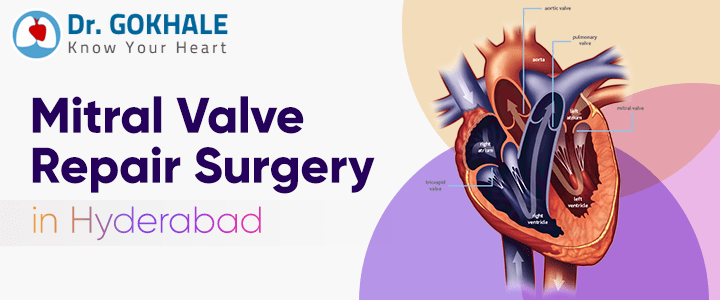A medical treatment called mitral valve repair surgery is used to treat mitral valve disease, which affects the heart’s mitral valve. The left atrium and left ventricle of the heart’s blood flow are controlled by the mitral valve. Damage or malfunction of this valve can result in several heart problems, such as regurgitation, or the backflow of blood into the atrium.
By addressing these anomalies and regaining normal valve function, mitral valve repair surgery aims to enhance the general health and function of the heart. Let’s delve into the details of the mitral valve repair surgery in Hyderabad.
Indications for Mitral Valve Repair Surgery
- Severity of Mitral Valve Dysfunction: When the heart’s capacity to pump blood effectively is compromised by severe regurgitation or stenosis, a mitral valve replacement procedure is necessary.
- Symptoms and Functional Impairment: To relieve symptoms and enhance quality of life, patients with mitral valve disease who have symptoms such as palpitations, exhaustion, chest discomfort, or shortness of breath may need surgery.
- Structural Damage: Patients who have structural damage to the mitral valve, such as prolapse, flail leaflets, or chordal rupture, which compromises valve function, may require mitral valve repair surgery.
- Progressive Nature of Disease: Surgery may be advised to prevent future heart function deterioration if mitral valve disease is progressive and does not improve with medication.
- Risk of Complications: Surgery may be advantageous for patients who are at risk of experiencing negative consequences from mitral valve disease, such as heart failure, arrhythmias, or endocarditis.
Preparing for Surgery
There are a few crucial things to take to get ready for mitral valve replacement surgery. Patients will first go through a thorough preoperative evaluation, which may include a physical examination, an assessment of their medical history, and diagnostic procedures including cardiac catheterization and echocardiography. It’s useful in evaluating overall cardiac function and the degree of mitral valve dysfunction.
Counseling on the surgical technique, its dangers, and anticipated results may also be given to patients. They might also need to change their way of living, such as giving up smoking or other such habits. Lastly, to ensure an effective surgical result, patients may undertake preoperative medical condition optimization in addition to receiving guidance on eating habits before surgery.
Follow-up Care and Monitoring
- Routine follow-up consultations with the cardiologist and heart surgeon following surgery.
- Keep an eye on your vital signs and any indicators of problems like bleeding or infection.
- Echocardiograms to evaluate how well the repaired mitral valve is working.
- If recommended, anticoagulant treatment is used to stop blood clots.
- Return to regular activities gradually while being monitored by a doctor.
- Lifestyle changes, such as eating a heart-healthy diet and engaging in regular exercise.
- Maintaining compliance with prescription drug regimens and any further advice given by medical professionals.
At Apollo Hospitals, Jubilee Hills receives top-notch cardiac treatment from Dr. Alla Gopala Krishna Gokhale. As a leading expert the leading expert in cardiac surgery in Telangana and Andhra Pradesh, having performed about 50 effective heart transplant procedures and 5 lung transplant surgeries. If you are looking for a heart specialist in Hyderabad or exceptional mitral valve repair surgery and cardiac care, place confidence in Dr Gokhale’s expertise.
 Ask Doctor
Ask Doctor
